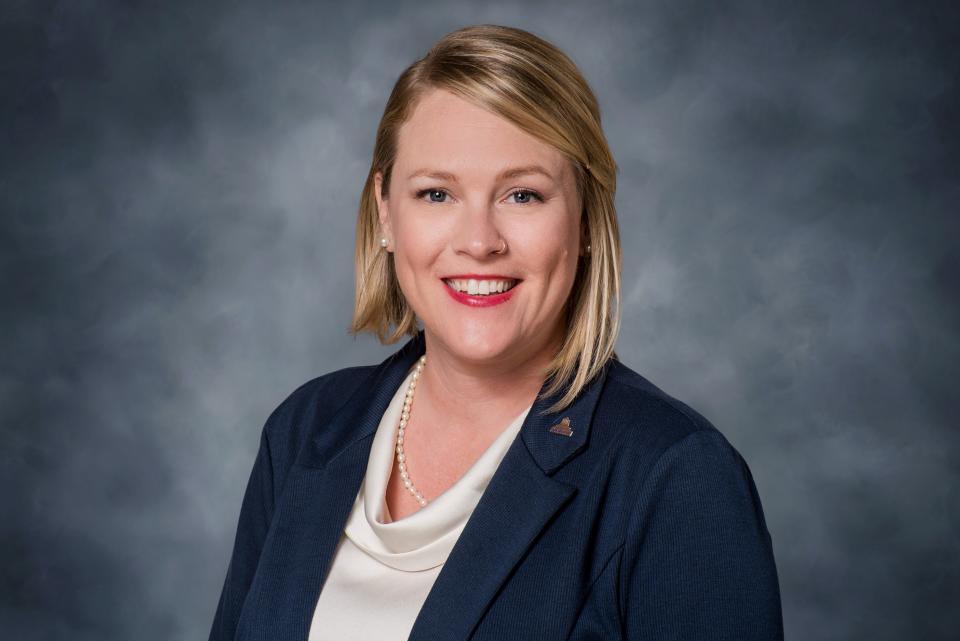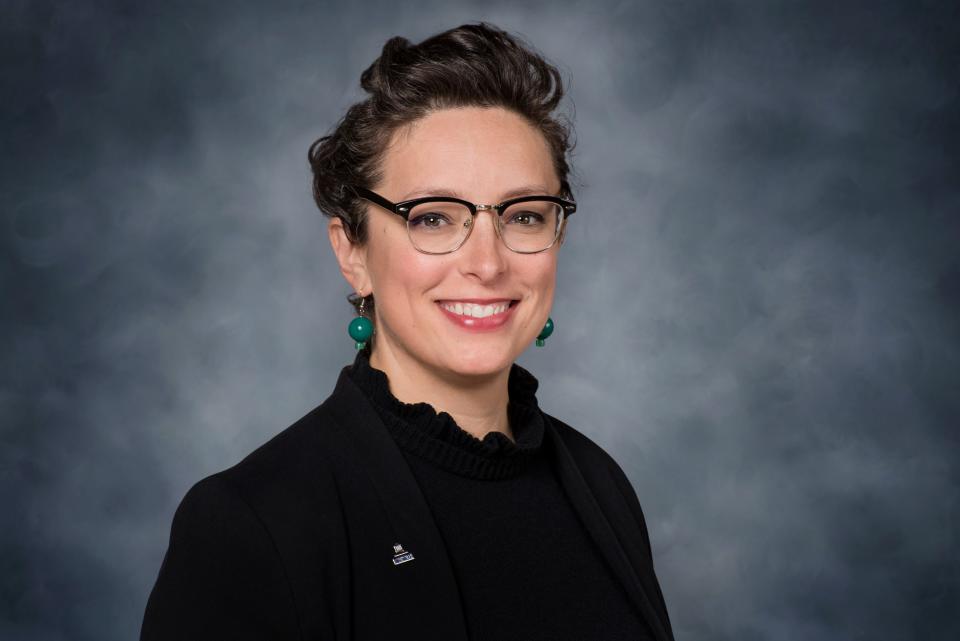Asheville council member Roney responds to public safety open letter with 'amendment'

ASHEVILLE - Five days after an open letter went public, attesting commitments to public safety and signed by a majority of council, Kim Roney, one of two city council members whose names were absent from the statement, has sent out a letter of her own.
Billed as an "amendment" to the original letter, Roney reiterated shared concern but was disappointed that "urgency was a barrier to collaboration," in reference to the abbreviated deadline of the initial letter — which she said was sent to her by Councilmember Maggie Ullman the night before it went out, with a deadline of the next morning.
Roney told the Citizen Times that her first response to the initial letter was to ask for more time, both because there were serious issues of which she had shared concerns, but there were also elements she felt were missing.
“Gun violence, violence among our youth and intimate partner violence are really serious issues and I didn’t see that addressed. I didn’t see the issues with neighborhoods and climate emergency being addressed," Roney said. "There are solutions that really needed the spotlight on them."
The first letter, which was sent Aug. 10 by Ullman, council's newest member, was intended to highlight ongoing investments in police, housing, health and downtown.

When reached for comment, other City Council members said it was intended to communicate a clear and united message, with multiple ongoing council efforts compiled into one place. The letter was titled "Both/And Solutions for Public Safety Are Growing."
It lingered on topics that have plagued recent conversations about downtown, like allegations of increased crime and a multitude of cleanliness initiatives, but made no mention of gun violence or racial disparities in public safety, an omission that both Roney and other community leaders have noted.
The GAP Report, or "Government Accountability Project" compiled regularly by its "strategy team," which includes Keith Young, former City Council member and architect of Asheville's reparations program, addressed the first letter in an August report.
It questioned why the initial letter did not mention how challenges in public safety, housing and health care are "deeply interwoven with challenges related to race and racism."
"We would suggest that the effects of these strategies won't be felt universally without recognizing and addressing how each is tied to systemic racism," the report said.
Young called the letter a "head-scratcher." While public safety concerns are no surprise, he said, looking at the letter, he's left asking: Why now?
“I’m really kind of perplexed why this is out there," Young said. "Not saying it’s a bad thing,” but it leaves him wondering what precipitated it, and why it was released so quickly without all council members weighing in. He hoped for more substantive solutions to come.
Who signed the initial letter?
Ullman's initial letter was signed by five of the seven city council members, with the exception of Roney and Antanette Mosley, who said she was traveling at the time it was sent out and was unable to review it.
Roney said she did share her letter with other City Council members before it was published, but was not asking for their signatures as her message was intended as an amendment.
"That’s the spirit of this letter. It’s to amend. To add. To bring to the conversation the things that we’re missing in the first letter that I know that my colleagues care about and could have been in the letter if we had taken time," Roney said.

Open letter about public safety: 5 Asheville City Council members signed onto an open letter about public safety. Why now?
When reached for comment, Mayor Esther Manheimer, who signed the first letter, said Roney's points mentioned in her letter seemed consistent with the council priorities recently named through its annual planning process. Reimagining public safety was a central conversation at council's March retreat, where it remained a top priority of council, as it had been in 2022 and 2021.
Ullman did not respond to a request for comment by press time.
City attorney Brad Branham said while statements of this type "are not at all uncommon," in his four years with the city, he couldn't recall another open letter from council like the first. Manheimer agreed it's not "typical" for Asheville.
What was in Roney's letter?
Among the eight bullet points in Roney's letter, sent Aug. 15, were both ongoing programs and other efforts she said: "our community is eager to take with us." These include investing further into the Buncombe County Community Paramedicine program, rather than the city duplicating its own program, reducing homelessness by following the 112 strategies identified by the National Alliance to End Homelessness in a January report and activating violence interrupter programs, intended to prevent gun violence and intimate partner violence.
Roney also named a desire to:
Release the Strategic Partnership Funds, intended to address the opportunity gap in area schools.
Bolster neighborhood resiliency by implementing neighborhood plans and more.
Commit to the city's ongoing Community Reparations Commission recommendations, expected to land in April.
Implement strategies found in the Close the GAP plan intended to create safer streets.
Regain living wage certification by meeting Just Economics of WNC's named rate of $20.10 an hour.

"When we only talk about one neighborhood, we are missing the wholeness of our city, and our whole city is facing issues of violent crime, lack of access to resources, our roads not being safe for the people who use them, a need for affordable housing," Roney told the Citizen Times.
“So my hope is to expand that spotlight so that we are able to see all the parts ... these issues belong to all of us, just like our budget belongs to all of us, and the accountability belongs to all of us.”
Potential panhandling ordinance expansion cause for concern
Roney's letter, titled "An Amendment: A Necessary Path Towards Reimagining Public Safety for All," also noted the danger of "distraction," calling out newly proposed changes to the city's panhandling ordinances, which has sparked widespread debate among community members and, according to Branham, may restrict the way people are allowed to ask for and receive handouts on city streets.
It's an effort that "distracts staff time and taxpayer dollars," Roney said in the letter. She said the ordinance "is not the right tool to address the very serious issues at hand" and stands to not only cause more problems but opens council up to the potential of a lawsuit by attempting to criminalize giving and receiving resources.
Branham told the Citizen Times Aug. 4 that a complete ban on giving from vehicles, an idea floated at an Environment and Safety Committee meeting, would be unconstitutional and the city of Asheville is not considering it. Other restrictions, such as time, place and manner in which giving can occur, are being considered.
The potential panhandling ordinance change was not mentioned in the first letter sent by the majority of council, which will review the ordinance at its Aug. 22 meeting. It will also be discussed at the Aug. 17 virtual City Council agenda briefing.
"The choice is ours," Roney said in closing out her letter: "Is the City of Asheville going to continue with distractions and squander resources or focus on implementing our adopted plans and stay on a path towards equity in our Strategic Priorities?"
Car windows were smashed: Asheville City Council's Maggie Ullman says her car windows were smashed, tires slashed
Downtown Safety Initiative: APD reports an increase in both violent and property crime
Sarah Honosky is the city government reporter for the Asheville Citizen Times, part of the USA TODAY Network. News Tips? Email shonosky@citizentimes.com or message on Twitter at @slhonosky. Please support local, daily journalism with a subscription to the Citizen Times.
This article originally appeared on Asheville Citizen Times: Asheville Kim Roney responds to letter signed by majority city council

